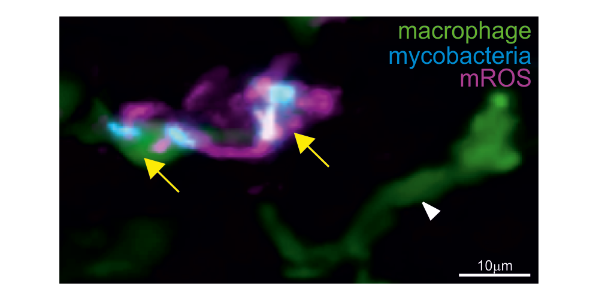
Submitted by Penny Peck on Fri, 24/06/2022 - 12:04
The results of a collaborative research study involving MRC MBU members have been published in Science.
The study was led by Professor Lalita Ramakrishnan (Group Leader in the MRC Laboratory of Molecular Biology's Cell Biology Division and Head of the University of Cambridge’s Molecular Immunity Unit (housed at the LMB).
Tumour necrosis factor (TNF) is a critical host resistance protective factor against tuberculosis (TB). However, an excess of TNF produces susceptibility by increasing mitochondrial reactive oxygen species (mROS), which initiate a signaling cascade to cause pathogenic necrosis of mycobacterium-infected macrophages.
In zebrafish, the authors identified the mechanism of TNF-induced mROS in tuberculosis. Excess TNF in mycobacterium-infected macrophages elevates mROS production by reverse electron transport (RET) through complex I. TNF-activated cellular glutamine uptake leads to an increased concentration of succinate, a Krebs cycle intermediate. Oxidation of this elevated succinate by complex II drives RET, thereby generating the mROS superoxide at complex I.
The complex I inhibitor metformin, a widely used antidiabetic drug, prevents TNF-induced mROS and necrosis of Mycobacterium tuberculosis–infected zebrafish and human macrophages; metformin may therefore be useful in tuberculosis therapy.
Professor Mike Murphy was involved in the design and analyses of experiments and Hiran Prag a postdoctoral member of Mike’s research group, performed some of these experiments. Professors John Walker and Edmund Kunji are acknowledged for their expertise and critical appraisals and Dr Nils Burger, a former PhD student of Mike Murphy, was involved in discussions about mass spectrometry.
Article Reference: Roca, F. J., Whitworth, L. J., Prag, H. A., Murphy, M. P. & Ramakrishnan, L. Science 376, eabh2841 (2022)
MRC Laboratory of Molecular Biology news article

